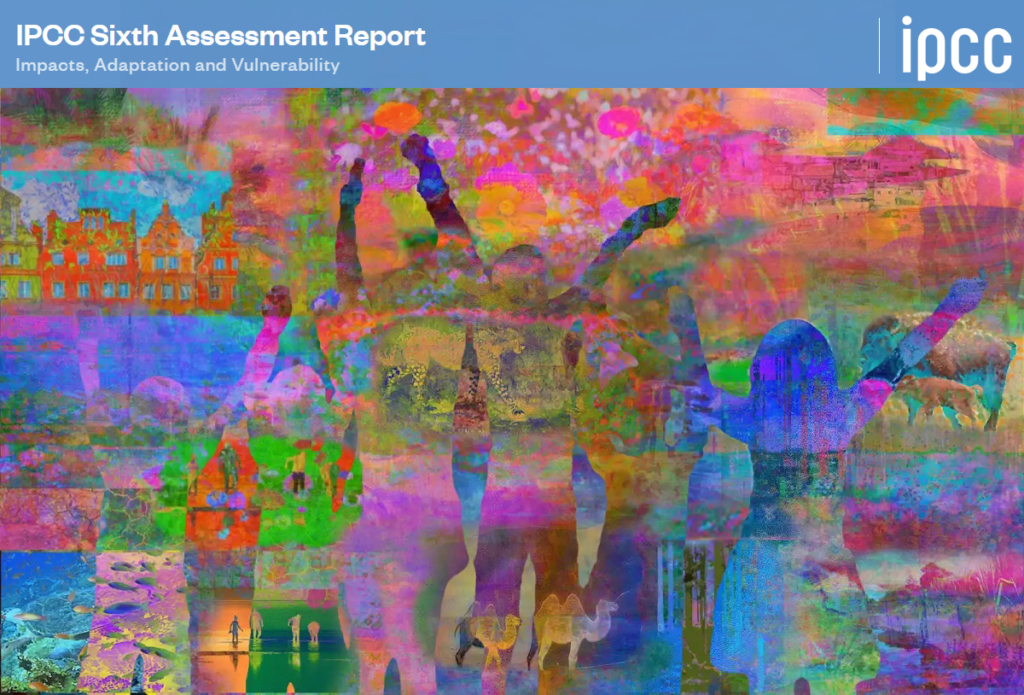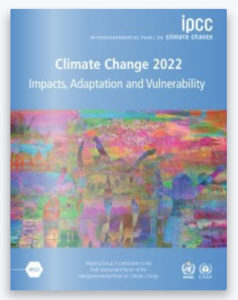IPCC Report, Part II: The climate crisis is here — so now what?

Overshadowed by Russia’s invasion of Ukraine, on February 28, the Intergovernmental Panel on Climate Change (IPCC) released the second part of its Sixth Assessment Report.
The report, approved by the governments of 195 countries, analyzes the current impacts of climate change on ecosystems, biodiversity and human communities, identifying vulnerabilities and potential limits to adaptation in our changing world.
Part one was released on August 9, 2021. That report — you can read more on it here — was a review of scientific literature, government data and reports, and other credible material on climate change from around the world. And for the first time, it concluded that humans are unequivocally playing a role in climate change and the impacts happening today.
 In this follow-up report from a second working group, 270 researchers from 67 countries analyzed the current state of global responses to climate change, and their evaluation was, frankly, horrifying. They believe — with a high degree of confidence — that climate change has already negatively affected the physical and mental health of people around the world, stressing natural and human systems alike to a much greater degree than previously expected. They warn that “some of the changes are so extreme and fast that they will push communities beyond their ability to deal with them in places like the Arctic and along some coastlines and pose a serious threat to food systems in many regions within decades.”
In this follow-up report from a second working group, 270 researchers from 67 countries analyzed the current state of global responses to climate change, and their evaluation was, frankly, horrifying. They believe — with a high degree of confidence — that climate change has already negatively affected the physical and mental health of people around the world, stressing natural and human systems alike to a much greater degree than previously expected. They warn that “some of the changes are so extreme and fast that they will push communities beyond their ability to deal with them in places like the Arctic and along some coastlines and pose a serious threat to food systems in many regions within decades.”
In perhaps the most blunt reaction to the report, United Nations Secretary General António Guterres said: “As climate impacts worsen — and they will — scaling up investments will be essential for survival…delay means death.”
Beyond the need to act quickly, it’s also important to note that ongoing climate stress is not felt equally across the globe. Climate change is placing a disproportionate burden on poor and developing countries, which are conversely among the countries least responsible for the current situation. For example, 15 times more people were likely to be killed by floods, droughts or storms in poor nations compared to the world’s wealthiest countries between 2010 and 2020.
Meanwhile, wealthy nations are several billions of dollars behind on their promise to collectively deliver $100 billion per year to the developing world by 2020, which was intended to support a shift to cleaner energy sources and climate change adaptation.
Here in North America, we won’t be spared from impacts — indeed, some have already become evident. Some of the findings as they relate to North America, in particular, Alaska and Northern Canada:
- Disproportionate harm to Indigenous Peoples’ livelihoods and economies — for example, 31 Alaska Native communities are already facing imminent displacement due to flooding and erosion, with four tribes already in the process of relocating from their quickly disappearing villages
- Increased permafrost thaw in Arctic Alaska and Canada
- In Alaska and Northern Canada, where locally harvested foods are critical to diet, climate change may introduce new pathogens to local food sources through wildlife range changes, warming temperatures, etc.
- By the end of the century, the economic impact of the projected reconstruction of Alaska’s public infrastructure due to climate change (mainly from permafrost thaw) is estimated to range between $4-5.5 billion USD
- Ocean warming will increase the frequency and intensity of marine heatwaves, accelerate unprecedented rates of sea ice loss, and alter ocean circulation, chemistry and nutrient cycling in ways that profoundly impact marine productivity, biodiversity and food webs
World leaders have pledged to limit warming to 1.5 degrees Celsius above preindustrial levels, however, current emissions regulations have the world on track to warm between 2 and 3 degrees Celsius by 2100. At 2 degrees of warming, up to 3 billion people could face chronic water scarcity, among other extreme challenges.
Those are important realities to keep in mind as the calls by oil and gas supporters to ramp up drilling in places like the Western Arctic and Arctic National Wildlife Refuge intensify. Massive, long-term projects like those are several years if not a decade away from producing oil — so won’t impact the spike in gas prices caused by Russia’s invasion of Ukraine — and instead will only deepen our dependence on fossil fuels while ignoring the grave danger of climate change. ConocoPhillips’ Willow project, for example, would lock us into more than 30 years of production and would produce more than 260 million metric tons (MMT) of carbon dioxide — equal to the annual output of one-third of U.S. coal power plants OR 56 million vehicles over an entire year.
To make matters worse, we now also face the need to adapt much of our infrastructure and policies to confront disasters that are already occurring. The U.S., like many nations, is woefully unprepared to address all these issues simultaneously, and while the report offers strategies to individual nations to mitigate disaster, such as elevating infrastructure above flooding levels or developing heat-resistant crops, this crisis is global, and its solutions must be as well.
A third report is scheduled to be released in early April 2022 and will include a review of responses to the global climate crisis described in parts one and two.
More details on Working Group III are available online.

Further reading:
IPCC Report: The climate crisis is here, and humans are a major reason why (Maddie Halloran, 9/7/2021)
This climate crisis report asks: what is at stake? In short, everything (The Guardian, 2/28/2022)
Climate change is harming the planet faster than we can adapt, U.N. warns (The New York Times, 2/28/2022)
Will the Supreme Court frustrate efforts to slow climate change? (The New York Times, 2/26/2022)
Supreme Court will hear biggest climate change case in a decade (The New York Times, 2/27/2022)
The science of climate change explained: facts, evidence and proof (The New York Times, 11/6/2021)
Cover image: “A Borrowed Planet — Inherited from our ancestors. On loan from our children.” by Alisa Singer
www.environmentalgraphiti.org © 2022 All rights reserved. Source: IPCC.
